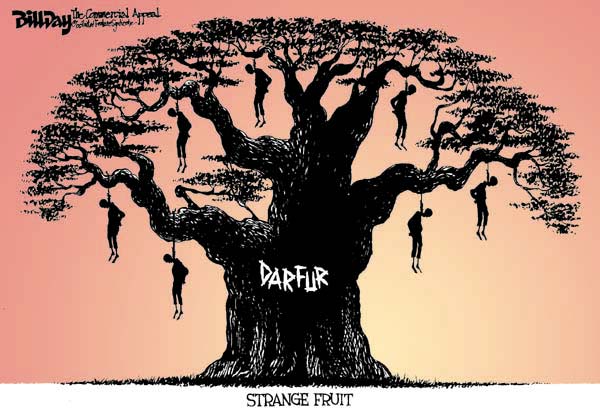
Billie Holiday, nicknamed Lady Day, was a famous African American jazz singer from the 1930s. She was not only known for her vocal style but also for some her songs. One of her most famous is "Strange Fruit".

The song was written by Abel Meeropol, a Jewish man from the Bronx. Since the racial relations were quite hostile in the 1930s due to the incidents of lynching, writing a song condemning lynching was definitely one of the riskiest things to do in the U.S. at that time. He wrote the song in the late 1930s because he was so disturbed by the racism especially after seeing a photo of a lynching.
The lyrics in general compared the lynched bodies to fruit when Holiday sings "Blood on the leaves and blood at the root/ Black bodies swinging' in the Southern breeze". The Southern breeze detail implies that most of these murders occurred in the Deep South which is an area that is known for its hostility towards African Americans. The lyrics add imagery to it in order to imply that the song is about lynching without actually saying it thus making "strange fruit" an euphemism for hanged bodies. It allows the listener to make his or her own conclusions. Holiday's particular voice is very soulful and it evokes sadness and makes the audience believe that lynching is a serious issue.
When I first heard this song in my freshman year of high school, I knew off the bat that it was about lynching. I had already known that lynching was a serious issue in the 1930s but the sadness in Billie Holiday's voice made me feel more implored to do something about it even though these murders occurred more than seven decades ago. Also, the style of the music also affected me because the slow beat and the blues feel to it made me think that this song was going to be dramatic but not necessarily happy or upbeat.
Although this song was produced in the 1930s, it also relates to the Letter from Birmingham Jail written by Dr. Martin Luther King Jr. They are both protesting the unfair treatment of African Americans and they both also showcase ethos, kairos, pathos, and logos. Holiday and King also both used their professions to protest about the treatment of African Americans. Holiday used her talents as a singer to sing about the horrors of lynching and King used his leadership as an activist to convince the entire nation and world that racism was wrong. However, Strange Fruit uses more pathos due to the emotion heard in Holiday's voice while Dr. King's letter is a more of a logos based argument.
- My Keys
Listening to this song for the first time in my life, the first thing that hit me was being able to feel the haunting pain in her voice. I don't know how to explain it, but it's like you can feel her words floating through you. I found the metaphor between lynching and fruit to be very powerful because in essence, what was the South known for? Peaches, oranges, and brutality towards Blacks. "Southern trees they are a strange fruit" is SUCH a powerful comparison. The entire concept was beautifully written by Meeropol, truly capturing the evils of racism. I liked how you compared Martin Luther King to Billie Holiday in their use of fame to spread a message. Although, I noticed you referred to fruit as a colloquialism for lynching. I think the proper term is a euphemism. Besides that, this was a great post and I'm glad you guys chose such a powerful song.
ReplyDelete-Ashley McNeill
I think your giving attention to the "hidden meaning" of this beautiful song, that isn't nesecary.
ReplyDeleteI whole heartedly agree that this song appeals to pathos. The way the song and the voice sounds affects our emotions. Is there any thing else?
Music that was controversial, really had to get squeezed through. Im not sure of the effect of the release of this song. But perhaps it, and it's effects, could be compared to all those, say, tv footage in the 1960s of black people being subjected to firehoses and dogs , which had huge effects on the pathos of white americans and really furthered civil rights movement of 60s. Just a thought
A quote you may like . La Marseillaise is the french anthem.
"In October 1939, Samuel Grafton of The New York Post described "Strange Fruit": "If the anger of the exploited ever mounts high enough in the South, it now has its Marseillaise."
A modern equivalent maybe could be a rap song about mass incarceration of black people. I know a bunch, if you need.
I had listened to this song for the first time several years ago. I agree with Ashley, as to me it seems that this song seeps through you. The words create such powerful images of the South being tainted by the deaths of African-Americans. The image that comes to my mind while listening to it is of rotten fruit, rotten being the unethical and disgusting treatment of African-Americans. I thought your remark of Dr. King's letter being more of a logical appeal and “Strange Fruit” as an emotional appeal that immediately evokes a response in the listener quite interesting. I also found it interesting that you underlined that writing a song in and of itself was a powerful action at the time. The influence that music can have in spurring people to action is incredible, and it is evidenced that music had a strong effect on influencing popular culture in the 1950’s and 1960’s.
ReplyDelete- Lina Bauer